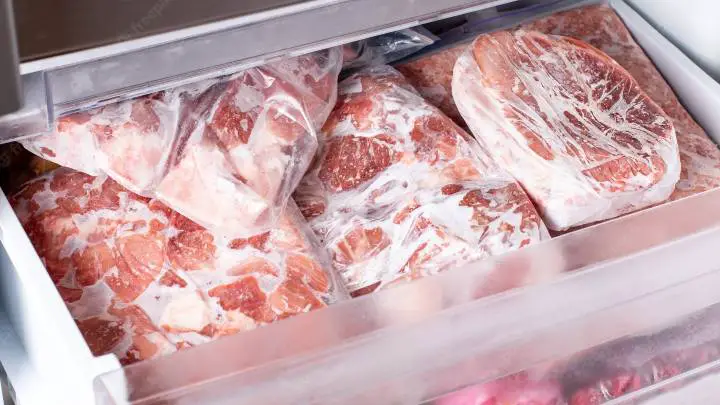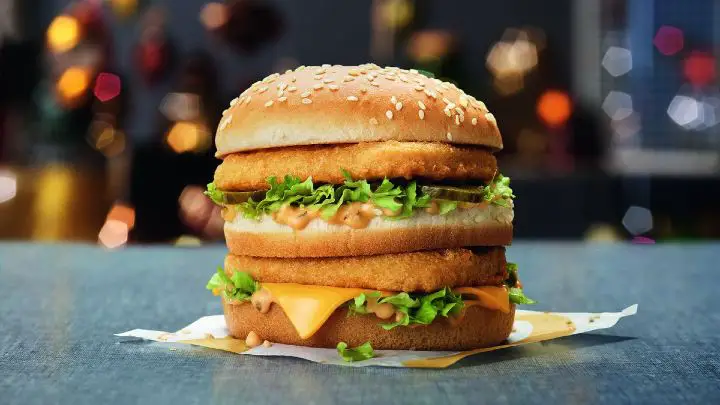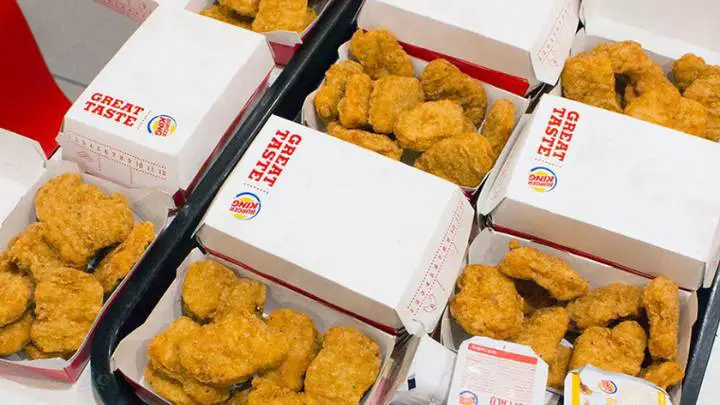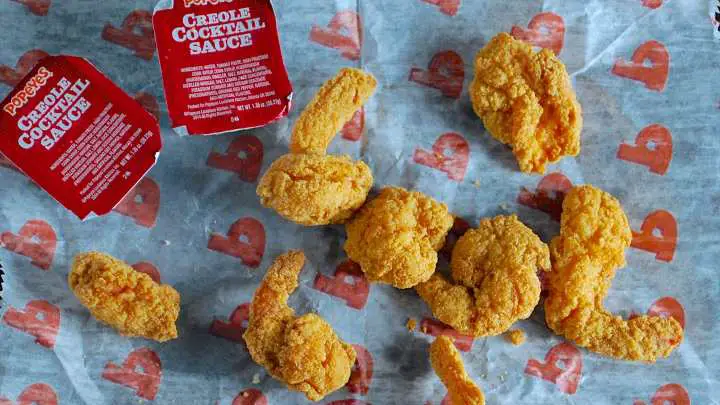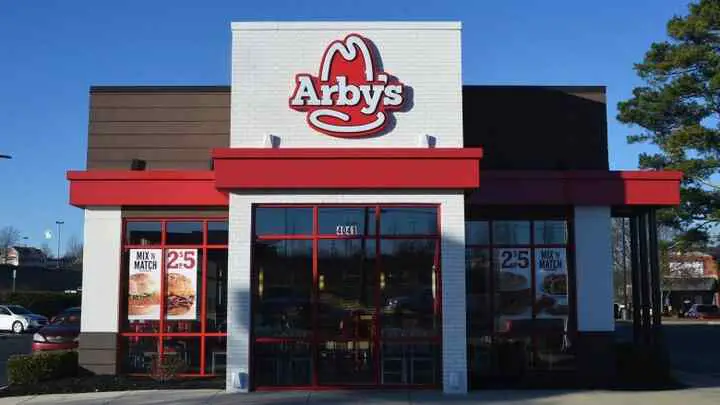The freezing temperature for meat always varies depending on the type of meat. However, one thing is certain – meat must be frozen, especially when raw, to ensure quality and longevity.
Furthermore, doing so is very simple, though it must be done intricately to avoid the meat quality deterioration inside the freezer or becoming freeze burned.
If you want to learn more about freezing temperatures and how to better preserve meat, keep reading until the end.
SEE: Can You Freeze Crab Meat or Is It Only Good When Fresh?
What is the best freezing temperature for meat?
It is always advisable to keep meat frozen at or below 0°F (-18°C). According to the USDA, at this temperature, bacteria cannot grow, and all other microbes, including yeasts and molds, are killed off in the food.
What is the ideal temperature for freezing meat?
The best temperature, which is at or below 0°F (-18°C), is the same as the ideal temperature.
SEE: Get a BOGO Offer or Free Meal at M&M Food Market
How long can you keep the meat in the freezer?
The FDA states that cuts like roasts can be frozen for four to twelve months and cutlets for six to twelve months.
For no longer than 3 to 4 months, ground beef should be kept frozen. Also, those hearty leftovers from beef can be safely frozen after cooking.
How long does it take to freeze meat and poultry?
Food loses quality and has a higher chance of developing freezer burn the longer it is frozen.
The USDA offers the following advice on how long to freeze meat and poultry to preserve top quality, even though it is safe to do so well beyond these times:
- Sausage and bacon: 1-2 months
- Chops, roasts, and steaks: 4–12 months
- 3 to 4 months for raw ground meat
- Whole, uncooked poultry: 12 months
- Parts of raw poultry: 9 months
SEE: The Most Common Types of Red Meat Animals
Why should meat be frozen?
When food is frozen, some bacterial growth can be slowed, but if it is not packaged properly, it might not be enough to prevent spoilage.
Additionally, effective freezing guards against pathogenic bacteria, the culprits of foodborne diseases and contamination. Furthermore, secure storage prevents the meat from losing flavor and quality.
What are the benefits of freezing meat?
Freezing the meat is always a good idea if you wish to eat healthily and are concerned about getting bacteria into your meat.
The only drawback to freezing food is when it is improperly packaged and loses quality while being stored in the freezer.
However, its benefits are pricey, so you should always freeze the meat.
1. Convenience
The ability to quickly prepare healthy meals for themselves and their families is made available to busy people by frozen meat dinners.
To create wholesome, flavorful, gourmet-caliber meals, frozen meat suppliers use superior planning, storage, and reheating techniques.
Additionally, frozen meats expose consumers to meat products they might not otherwise consume, such as ethnic foods that require lengthy preparation times.
2. Better quality meat
When an animal is the right weight to be butchered, the result is soft, better-quality meat that is more tender tastes better, as well as a healthier choice for consumption.
3. Free from harmful preservatives
Frozen meat does not require any unhealthy preservatives, in contrast to many other packaged foods that are gradually becoming a major part of western diets.
It is a typical procedure that only requires packaging with little to no preservatives and a temperature reduction.
4. Food safety
Food poisoning can be caused by potentially dangerous bacteria, which can be reduced by freezing food. Frozen meat is safe if you store it according to recommended practices and cook and thaw it as directed.
5. High nutritional value
It is said that frozen meat keeps significant amounts of calcium, vitamin b12, vitamin b3, vitamin b6, iron, zinc, selenium, and a variety of other vitamins and minerals. Additionally, meat has high-quality protein, which is essential for the health of bones and muscles.
6. Carbon footprint reduction
The fact that you can help the world is a concept you’ve never associated with frozen meat. You can reduce your carbon footprint by making fewer trips to the butcher shops if you buy frozen food.
SEE: How Long Can Raw Meat Sit Out Before It Goes Bad?
How to store meat in the freezer
To avoid freezer, burn, which happens when food is exposed to air, one of the most crucial steps when freezing red meat, poultry, ground meat, bacon, or sausage is to wrap it airtight.
Although freezer burn is not harmful, it can impair food’s flavor, texture, and appearance. Therefore, it is best to add a second airtight layer or to transfer the meat or poultry to new, sealable packaging, especially for longer-term storage.
Also, meat and poultry can be frozen in their original packaging, but it is typically not airtight. However, if you have found that you purchased meat or poultry that has been vacuum-packed, it is already airtight and prepared for freezing.
SEE: What is Miracle Thaw and How Does It Work
How to thaw meat after freezing
Meat from the freezer can be thawed and defrosted in three different ways.
1. The refrigerator
Thawing the sealable parcel in the refrigerator is the slowest and possibly safest method. While larger cuts of meat may take several days to defrost, smaller cuts may take just a few hours.
2. In cold water
Meat can be put in a leak-proof plastic bag and set in a tub of cold water to safely thaw it more quickly. Every 30 minutes, the water should be changed, and the meat should be cooked right away.
3. Microwave
The defrosting of frozen meat can be aided by specific settings on some microwaves. If you’re using the microwave, defrost the meat first, then cook it all at once.
Note: Never thaw meat at room temperature in the open, whether on a counter or in the sink. At room temperature, bacteria can multiply quickly, according to the Centers for Disease Control and Prevention (CDC).
SEE: What is a Gamey Taste in Meat?
FAQs
Does putting meat in the freezer make it last longer?
It does, indeed. If you’re not going to eat the meat right away, it’s best to freeze it to prevent contamination.
What happens to meat when you freeze it?
When you freeze meat, it slows down the yeast and bacteria from contaminating the meat. Also, the nutritional value of meat is unaffected by freezing.
Does freezing meat affect quality?
No, it doesn’t. Nevertheless, if your beef is wrapped haphazardly and frozen slowly, you run the risk of degrading the meat’s quality and exposing it to freezer burn.
When meat is slowly frozen, the water inside transforms into ice particles that grow large and rip apart the structure of the fiber or muscle.
Why does meat turn gray in the freezer?
The color of frozen meat can occasionally change from red to gray due to an oxygen shortage or addition in the freezer, but it may still be safe to consume.
Conclusion
Freezing meat is an excellent method of storing and protecting it from spoilage. Because fresh meat can technically be stored indefinitely at the proper temperature.
Cooking can become a time-consuming chore for any busy person, which is why cooking frozen burgers or any other entree can be made easier when kept in the freezer and taken out to quickly prepare and serve a meal for yourself or a family.
As a result, when it comes to meat or another form of food preservation, freezing always comes first.
Thanks for reading.
If you enjoyed reading this article, view Cheffist for more.
